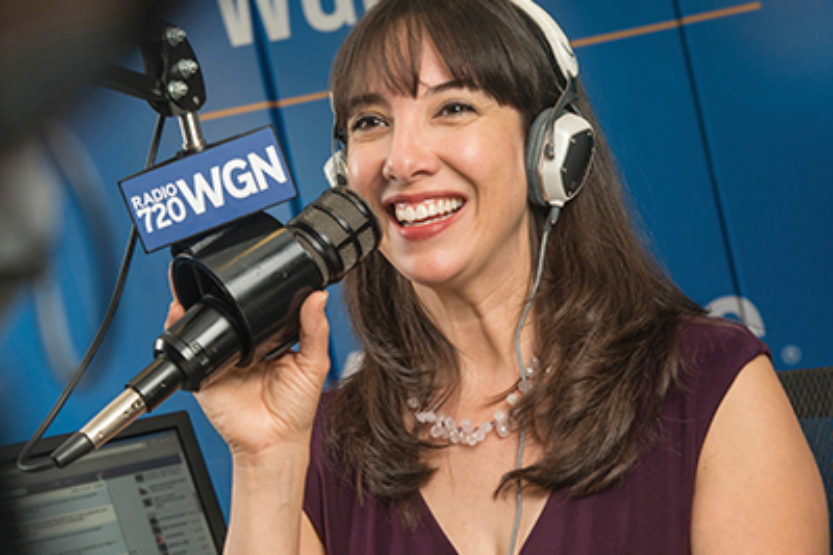Alumni Interview: Patti Vasquez
 Chicago comedian Patti Vasquez ’03 LAS says, “Comedy is all about storytelling.” She also does radio six nights a week. (Image by Lloyd DeGrane)
Chicago comedian Patti Vasquez ’03 LAS says, “Comedy is all about storytelling.” She also does radio six nights a week. (Image by Lloyd DeGrane) Comedians live life a little more intensely. Things that other people endure, we take as a slight. I was at a restaurant the other day, and these two women were standing in front of the bathroom sink. They were done, but they wouldn’t move. I said, “Excuse me?” I had to wash my hands between them while they kept on talking. I don’t know how, but they beat me to the front door, so I couldn’t get out. I said, “Excuse me.” Nothing. When I tried to get past, my shirt got caught on one woman’s purse. She didn’t even realize it. Then, when I was getting my car from the parking lot, there they were again! Walking right down the middle of the aisle, living in their own universe. What is it with these people?
For me, comedy is all about storytelling. That’s why I do standup and not sketch. I’ve loved standup since I was a kid when my parents let me stay up and watch Johnny Carson. I used to love going to the Improv on Wells [Street in Chicago] and watching the comedians, but it never occurred to me to actually do it until I saw Margaret Cho on a marathon of comedy on VH-1. She’s like me. Her parents were immigrants; she grew up with parents trying to assimilate. She had a certain rage about the treatment she received where she worked. A reviewer called her the zaftig Margaret Cho, which is not a compliment. No woman who hears the word zaftig feels good about it. But she was always good at having rage but not coming across as hostile and putting off the audience. I was fascinated by that.
I think comics are like philosophers, especially the ones who write from character, like Bill Cosby. He’s autobiographical, he takes elements of his life, his family, his kids, religion and weaves them into his stories. That’s what I aspire to—take the foibles of humanity and shed light on them. I always had a lot of stage presence, but when I was 21, I didn’t have a lot of material.
I always had a lot of stage presence, but when I was 21, I didn’t have a lot of material.
At Illinois, I was in Allen Hall. It was such a great dorm, filled with people from around the world, liberal arts students but also engineers. I was surrounded by people who motivated me to work harder. I was going to move to L.A., but then my dad got diagnosed with lung cancer.
I made a choice that family was more important. My dad and I were really close. We were pals. I was a daddy’s girl—he taught me to play baseball. We lived in a small, one-bedroom apartment in Chicago, and he and I shared a bunk bed. My mom threw us both out of her bedroom. My dad was expelled because he was a smoker and a snorer, and I walked and talked in my sleep, so she went out and bought a bunk bed and put it in the dining room where I was exiled. He never made me think there wasn’t anything I couldn’t do. Before I walked down the aisle at my wedding, he pulled me aside and said, “You’re the kind of woman other women wished they were and little girls dream of being someday.”
This year, I was hired by WGN Radio to do three hours of radio six nights a week. I do everything—talk to politicians, play music, make fun of Donald Trump. I recently wrote Trump a letter of gratitude for the sign on his building. I thanked him for putting his name up and not his toupee, and I thanked him for reminding Chicago politicians to read the fine print.
Griffin is my oldest son. I had an amazing pregnancy, and I thought, “I can do this again!” In the first trimester with [my second son] Declan, the doctors told me he had an irregular heartbeat. The last two weeks there were more complications. When he was born, he was put on a ventilator and life support. He was missing part of his brain, fibers that make up the corpus calossum, which helps the two sides communicate. They said if he survived, he’d never walk or talk. He started walking at 3 and doesn’t speak yet, but he’s very emotive and knows how to tell you what he wants. It’s definitely a challenge, not what I signed up for. It’s like when you have dreams and plans, and the universe says “not so fast.” There’s no training, no preparation, you have to go into battle mode.
I started an organization called With Kind Words for health-care providers, to teach them how to have compassionate communication with parents who face a new set of circumstances. I do seminars, give workshops, do one-on-one coaching. That’s my next crusade.

